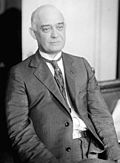November 7, 1922 | |||||||||||||||||
| |||||||||||||||||
 County results Peay: 50–60% 60–70% 70–80% 80–90% >90% Taylor: 50–60% 60–70% 70–80% 80–90% >90% | |||||||||||||||||
| |||||||||||||||||
| Elections in Tennessee |
|---|
 |
The 1922 Tennessee gubernatorial election was held on November 7, 1922. Democratic nominee Austin Peay defeated incumbent Republican governor Alfred A. Taylor with 57.9% of the vote.
Contents
Peay narrowly won the Democratic primary against Benton McMillin, defeating him by a little over 2%. With this win, Peay flipped the state back into Democratic control, with the state legislature also being controlled by Democrats. This is the last time that an incumbent governor of Tennessee lost reelection.

